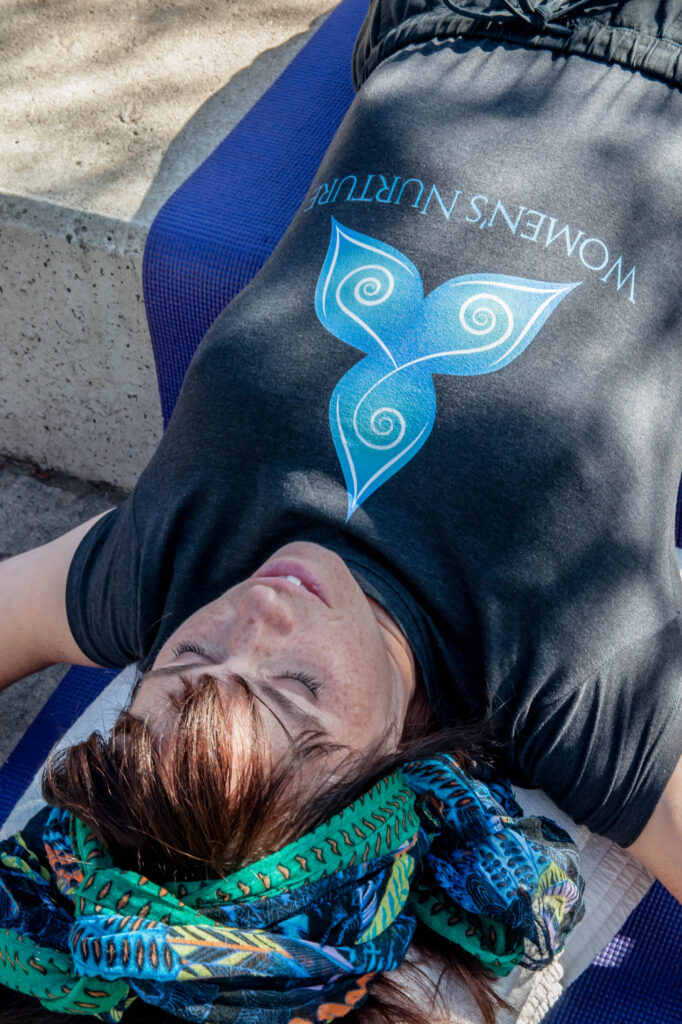Women need to be nurtured at every age and stage. Every human being needs this. But women, as primary nurturers themselves, often get caught up in the needs of others and think that by pushing their own needs aside, they can have more time and energy for their loved ones. Unfortunately, the opposite tends to happen, and they can find themselves in an energetic downward spiral. Subsequently, this allows chronic pain, distraction and low energy to negatively impact their interactions, relationships, overall health and breeds resentment. To nurture is not to indulge; to nurture is to address needs in a loving, compassionate way.
Nurture in the Childbearing Years

Probably the greatest self-nurture challenge for a woman over the course of her lifetime is how to carve out time and space for her needs while raising young children. The needs of young ones are real, present and persistent!! Further, many moms are also juggling a career ,and finding the right balance between so many demands is an exercise in adept priority shifting.
I do not advocate dismissing or ignoring the needs of your family…quite the opposite. We are biologically primed during these years to flow our loving, nurturing energy into our families. This is a wonderful aspect of women’s natures and is absolutely beautiful when executed in balance. The key word here is balance. We don’t want to learn bad habits that make us into victims or martyrs as we “selflessly” put our family’s needs first. This requires an exquisite level of discrimination in our choices.
Obviously, babies and very young children’s needs should be attended to quickly and lovingly. However, at some point, even with quite young children there is a delicate shift. Just as children go through a stage of differentiation as they become more independent and start separating their identity from mom, so must mom begin to become aware of her separation from her child or children. She is an individual, with a separate identity, and as such needs to care for her own needs, physical, mental and emotional.
We have a wonderful opportunity at this stage to lay groundwork for our health that will carry us through our entire lives. I advocate that you learn the skill of shifting priorities to include yourself, as early as possible. It doesn’t have to be large chunks of time, or expensive activities. It should be regular, consistent, scheduled time in an activity that you love. Something that fills your gas tank and feeds your soul. Not only will you feel refreshed and happier, but your family will begin to respect and appreciate your differentiation.
This is an excellent opportunity for modeling to your young children and spouse that mom is a special person and her needs are important too! The fact is, when you are not 100% accessible, 100% of the time, others have the chance to miss and appreciate you, even if it is just for an hour a week. Investing in yourself will reap the rewards of your physical and mental health for a lifetime, as well as set up healthy boundaries in your relationships.
Learning these skills do not make you a selfish person, but one who values herself and her health, and knows how to turn her love, attention and compassion inward as well as outward.
Nurture in Perimenopause/Menopause

As your children grow and you begin to anticipate more time and space for yourself, new responsibilities or life changes may suddenly rush in to demand your attention. Perhaps your career is beckoning for more hours and mental energy. Perhaps your parents suddenly need more help, and daughters are typically the primary caretakers of their aging parents. At the same time, your body begins to go through the most dramatic of changes, in some ways considered the finale of the show that began in puberty. However, due to the timing of this life stage, midlife, as opposed to the earlier stages of puberty and childbearing years, which are seen as blossoming, fruitful periods of woman’s life, perimenopause and menopause are often seen as the dimming of a woman’s light.
Yes, in terms of chronological years, we are closer to the end of our allotted years than we were at age 12, or when we were in our 20s and 30s; however, with life expectancy for women continuing to rise, we are far from the end of our days just yet! Just like every life stage, there are obstacles and there are opportunities. We can easily be influenced by the prevailing dread that so many cultural signals and stories transmit to us. Aging, for men and women is seen as a negative force in our culture, but all the more so for women, as the bias against aging women begins quite early, typically in perimenopause.
It isn’t all doom and gloom though. Yes, the female body, mind and spirit go through a lengthy process of transition in perimenopause, and a lot of the transition is uncomfortable, stressful, and mournful. This is what is emphasized so much in our world, like everything, the more negative, difficult aspects. There is balance however, as much of the transition is also empowering, healing, validating, and creative. The chemical changes in the brain can awaken stores of energy and perspectives that were dormant during the earlier stages of life. You find women in their midlives making huge changes in their lives, their relationships, their careers.
This is an ideal time to establish adaptive nurturing practices. Practices that promote the more positive transitions of perimenopause, while bolstering and securing the woman as she faces new vulnerabilities, unique to this stage. One of the very common desires of women at this point in her life is for quiet and peace. Even if her outer circumstances are still vying for her attention (older children, career demands, aging parents, shifting dynamics in marital or partner relationships, loss), she must find the quiet and respect this deep need.
Nurture in the Teenage Years

I strongly believe that we must instruct our daughters, nieces and granddaughters in the art and acceptance of nurturing themselves, in self-care and self-love, and in the knowledge and belief that her female body is well designed and made to last a lifetime.
The best way to achieve this is to walk the talk. To model great self-care, positive body image, and calm and peaceful relationships. However, we often fall short from being the exemplary mothers and role models that we want to be as we work on our own struggles with these goals. But with authenticity in our journey, sharing honestly our challenges (in an age-appropriate manner), and demonstrating that we are trying to love ourselves, even if we sometimes fail, will ring true as your teen goes through her own self-development. Showing her at your age that while you may not be perfect, you are still a beautiful work in progress worth investing in is a great way to both live the growth mindset and to demonstrate a woman’s value at all ages.
Even more impactful, sharing a nurturing practice together can significantly enhance your personal connection and strengthen your bond, while laying the groundwork for life skills that will assist her and steady her as she deals with her own physical, emotional and mental fluctuations as a young woman. It really is never too early to begin.
Further, there is so much misinformation, myths and just lack of knowledge about women’s cycles (monthly and throughout her life) that many teenaged girls are ignorant about what is going on in their bodies and what to expect as “normal.” It has been a failure in our health education system that our teens don’t realize the impact of their stress and lifestyle on their health and most young teenage girls are very nearly body illiterate.
As the mom of a teenaged daughter myself, I know that listening to mom during these years is an additional challenge and we are not always considered the authority (even if we are!). This presents us with an opportunity to plant gentle seeds of knowledge and acceptance, and to be sure that our communications with those in our lives reflects the values we want her to emulate. Because our girls are often listening in the background.
